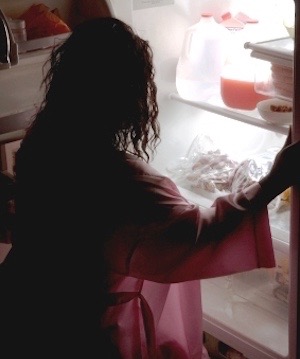
real problem that can be successfully treated.
Binge Eating Disorder, also known as ‘”compulsive overeating”, can perhaps best be described as a condition in which one periodically consumes extremely large amounts of food. Individuals with Binge Eating Disorder have a strong motivational drive for food and experience great difficulty in their attempts to restrain their eating. They frequently continue eating well beyond their satiation level, with many reporting that their behavior feels “unconscious”, and that they have little control over it. It appears that compulsive overeating is often done in response to emotional difficulties or psychosocial stressors. Unfortunately, during and after a binge, one is often left feeling more depressed, anxious and helpless than they did before they overate.
In addition to the psychological issues noted above, some researchers and theoreticians believe that compulsive overeating has played a significant role in the dramatic increase in obesity levels in the United States over the past 30 years. Obesity is commonly identified as having a body-mass index (BMI) over 30. Using this guideline, approximately 34% of Americans are currently classified as obese, compared to 15% in 1980. During this same 30 year period, this increase in obesity has led to a concomitant surge in diabetes and hypertension, both of which are risk-factors for heart disease, the number one cause of death in the US.
Binge Eating Disorder: Diagnostic Confusion and Controversy
There currently exists a certain amount of controversy about the diagnostic classification of Binge Eating Disorder. The condition is not listed in the 4th edition of the Diagnostic and Statistical Manual (DSM-IV) currently used in the mental health field when making diagnoses. However, the American Psychiatric Association (APA), which publishes the DSM-IV, has tentatively planned to include a diagnosis of Binge Eating Disorder in the upcoming DSM-5, which is scheduled for publication in May 2013. Aside from the issue of whether Binge Eating Disorder should be classified as a psychological disorder, there arises the issue of where it should be classified.
The urges experienced by those with Binge Eating Disorder are similar to the urges experienced in some impulse control disorders such as Trichotillomania (Hair Pulling Disorder), Dermatillomania (Skin Picking Disorder), and Pathological Gambling. This would suggest the possibility that Binge Eating Disorder could potentially be conceptualized as an Impulse Control Disorder.
On the other hand, many compulsive overeaters describe their experience as feeling like an addiction, not unlike that seen in alcoholism and other substance abuse disorders. This would indicate that Binge-Eating Disorder might best be classified in the APA’s planned new category of “Addiction and Related Disorders”, which is the tentative new name for the category of conditions currently known as “Substance-Related Disorders”. This new category is specifically meant to allow for the inclusion of “behavioral addictions” such as “Pathological Gambling”, (which, as noted above, is currently classified as an Impulse Control Disorder).
And then there are those who describe their relationship with food as having characteristics similar to Obsessive Compulsive Disorder (OCD) (hence the term “compulsive overeating”). While there are certainly obsessive and compulsive features in Binge Eating, we have argued elsewhere in this blog that there are significant phenomenological differences between compulsive overeating and OCD, and that conceptualizing Binge Eating Disorder as a type of OCD would be inaccurate.
Despite the above ambiguities, the APA’s current plan is for Binge Eating Disorder to be listed in the DSM-5 as an Eating Disorder, along with Anorexia and Bulimia. This seems intuitively appropriate, despite the fact that compulsive overeating has characteristics of Impulse Control Disorders, Addiction Disorders, and OCD. For a more in-depth discussion of the revisions planned for the DSM-5, click here.
Why Do People Binge
As noted above, Binge Eating Disorder can be conceptualized as an impulse control disorder, a behavioral addiction, an eating disorder, or even a type of OCD. Regardless of how the problem is classified, there are a numerous psychological and physiological issues that are commonly reported by compulsive overeaters.
Some of the psychological issues often described by compulsive overeaters include the following:
- Many who binge report that the compulsion to overeat is often an attempt to escape from their uncomfortable feelings and/or beliefs about themselves.
- Over time, binge-eating may lead one to develop a physiological tolerance to large quantities of food – and without those large portions of food, one may experience withdrawal.
- Like those suffering with behavioral addictions, many compulsive overeaters spend much of their time obsessing – in this case over food and how to get it.
- Also, people with Binge Eating Disorder may feel overwhelmed from the physical and emotional after-effects of a binge. Even though compulsive overeaters dislike their behavior and understand that their actions may have severe physical consequences, their powerful urges to overeat frequently win. The result is often overwhelming feelings of guilt, depression and disgust, which in turn often lead to more overeating.
It is also important that we not overlook possible physiological factors involved in overeating and obesity. One recent study conducted in Germany, Switzerland, and the United States found that 100% of severely obese study participants had a specific gene variation, compared to only 14% of those in the study who were not obese. A separate study found that binge eating runs in families, and that relatives of compulsive overeaters displayed a markedly higher prevalence of severe obesityin adulthood. And a 1993 UCLA study found that compulsive overeaters who binged on carbohydrates often have the same gene marker that is commonly found in alcoholics and other drug addicts. Combined, these and other studies suggest what many have long postulated – that compulsive overeating and obesity may be at least partly mediated by biological / genetic factors.
Treatment of Binge Eating Disorder / Compulsive Overeating
The good news is that there are treatment options available to those who suffer with Binge Eating Disorder. While not formally considered an Obsessive Compulsive Spectrum Disorder, compulsive overeating often responds extremely well to some of the same Cognitive Behavioral Therapy (CBT) techniques used to treat OCD and related conditions. Using CBT, clients can learn to better and more quickly identify their personal binge-eating triggers. A common CBT technique known as Cognitive Restructuring can help binge-eaters learn to challenge the distorted beliefs and thoughts they have about themselves, food, and eating that often precede and/or accompany a binge. Using other CBT techniques, compulsive overeaters can learn to replace their urges to overeat with new, healthier eating behaviors, and to utilize behavioral tools that can help to reduce their stress.
One of the most effective CBT tools is Mindfulness-Based Cognitive Behavioral Therapy (MBCBT). For binge-eaters, the overall goal of MBCBT is to learn to non-judgmentally experience their uncomfortable psychological and physiological experiences related to food and eating. Using mindfulness, compulsive overeaters can learn to become more aware and accepting of their uncomfortable thoughts, feelings, sensations, and urges related to food and eating, without giving in to the desire to overeat.
Combining these and other CBT tools, compulsive overeaters can change their relationship to food, and develop the ability to mindfully and healthfully eat, rather than using food as a means of coping with uncomfortable thought and feelings. If you feel that you (or your loved one) is “stuck” in the cycle of compulsive overeating, or that recovery is out of reach, please know that there is hope. The powerful feeling of being “out of control” can be replaced with healthier and more accepting perspective towards yourself and the food you eat. Lastly, do not assume that nobody understands what you are going through. There are trained mental health professionals at the OCD Center of Los Angeles and other specialty clinics who can help you find relief using a non-judgmental, clinically proven approach to treatment.
•Kimberley Quinlan, MFT, is a psychotherapist at the the OCD Center of Los Angeles, a private, outpatient clinic specializing in Cognitive-Behavioral Therapy (CBT) for the treatment of Obsessive-Compulsive Disorder (OCD) and related conditions. In addition to individual therapy, the center offers six weekly therapy groups, as well as online therapy, telephone therapy, and intensive outpatient treatment. To contact the OCD Center of Los Angeles, click here.




























































7 Comments
Thank you for sharing your struggles with Binge-Eating Disorder. I strongly believe it is crucial that we implement a mindful approach to our sense of satiation, and to how we think and feel about the food we eat. Nonjudgmental acceptance can bring such relief to those who struggle with their weight or with their relationship to food.
I really like the article on how they took this disorder and broke it down into three categories. i think they all go hand in hand . Ive struggled since i was 8 with ocd.. not knowing what it ever was..and through the years its always something new ..the obsession lasts a few years and then moves on to the next. im happy to say i can only really obsess about one major category in life at a time.
To know you are not judged is a remarkable feeling in recovery. No need to feel embarrassed and being true to others and yourself is a big task to get this under control.
I have suffered from anorexia, completely restricting certain foods, too binging , it is all about a sense of control. and a lot of women especially I’ve spoken with experience this: if everything in your life is haywire…the one thing you can control is what goes in your mouth…
But when you feel you cant control that either.. you binge but its really you expressing all your feelings because your world could be upside down at the time.. that is when mine triggers the most… I’m very black or white.. if i have a cheese puff i say “oh well i messed up” i think everyone needs balance and moderation in life… its just like alcoholism.. one drink isn’t enough.. or one cigarette…anything we ingest we can no longer control once we swallow just like the fact we cant control a lot of issues with our lives.
diane
Diane,
You are right! Judgement plays a huge role in the Binge-Eating cycle. Sometimes when we overeat, we feel guilty, which in turn makes us feel weak and unworthy. As a result, we turn to what we feel is a “true” and ” reliable” friend, food. And the cycle continues.
Taking away judgement and blame is crucial to the treatment of Binge Eating Disorder. It can be freeing and often “fills the emptiness” that causes us to over eat in the first place.
Best,
Kimberley
Great post Kimberley. There are definitely a lot of alarming statistics out there when it comes to obesity and binge eating. The one you mentioned above – 34% of Americans currently classified as obese should scare anyone, and it’s a trend that is only going to go up unless we make some drastic changes.
Thanks for your comments Deanna.
Hey there, nice article. I have one question though. I know you talk about it, but do you know whey they ended up categorizing the disorder as an Eating disorder and not in any of the other mentioned categories?
Sorry for my english.
Luke
Hi Luke,
Thank you for your comment. No great mystery here – the reason Binge Eating Disorder was classified as an eating disorder is because, by definition, it is a type of eating that is disordered. I encourage you to read our follow up article at about the overlap between OCD and eating disorders.